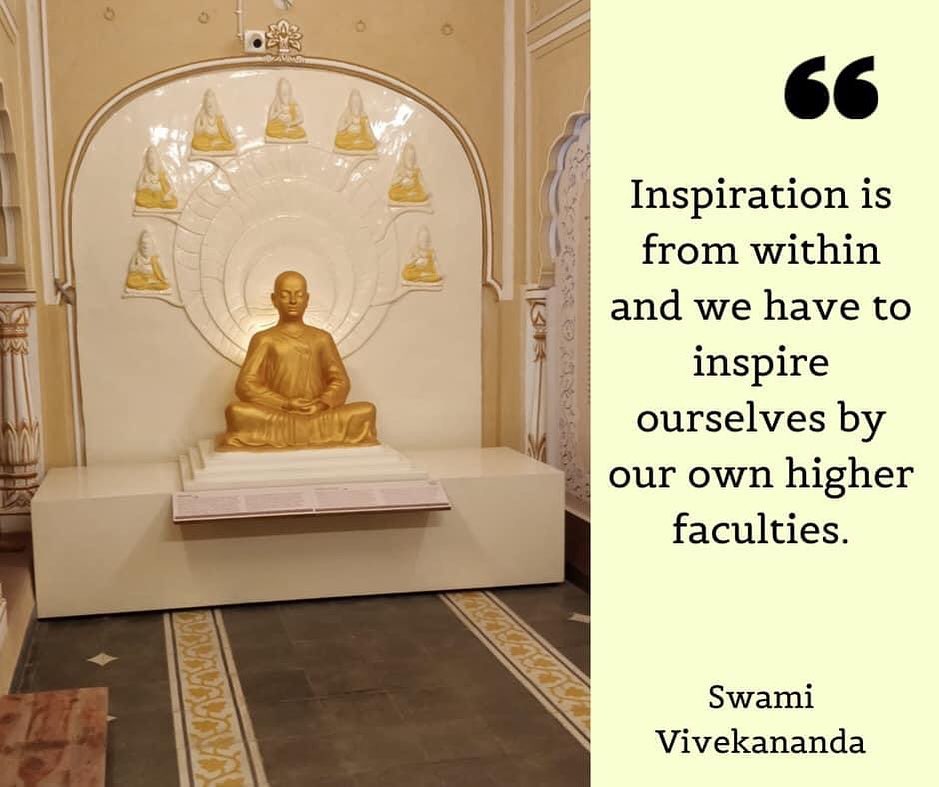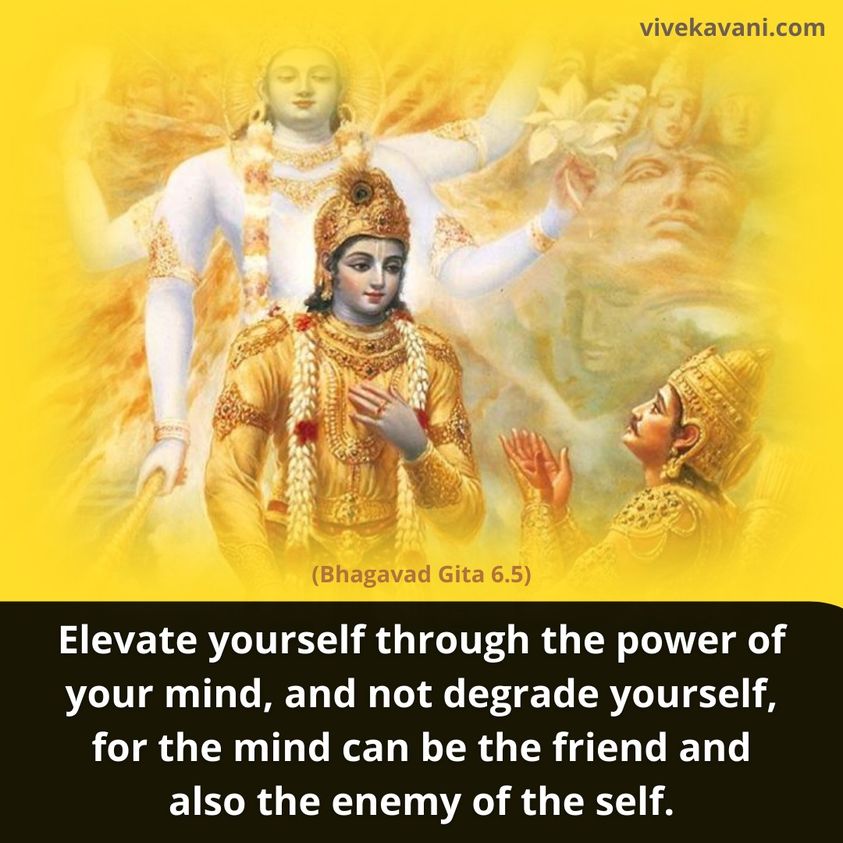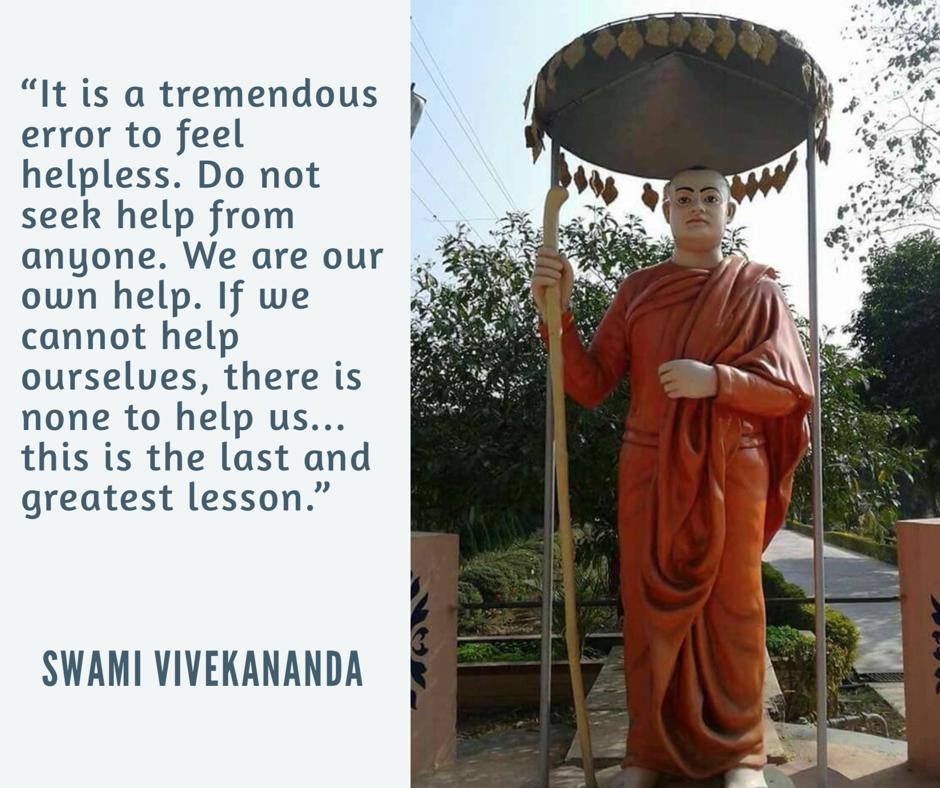उद्धरेदात्मनात्मानं नात्मानमवसादयेत् |
आत्मैव ह्यात्मनो बन्धुरात्मैव रिपुरात्मन: || 5||
uddhared ātmanātmānaṁ nātmānam avasādayet
ātmaiva hyātmano bandhur ātmaiva ripur ātmanaḥ
uddharet—elevate; ātmanā—through the mind; ātmānam—the self; na—not; ātmānam—the self; avasādayet—degrade; ātmā—the mind; eva—certainly; hi—indeed; ātmanaḥ—of the self; bandhuḥ—friend; ātmā—the mind; eva—certainly; ripuḥ—enemy; ātmanaḥ—of the self
Translation:
Let a man be lifted up by his own self; let him not lower himself; for he himself is his friend, and he himself is his enemy.
Commentary:
The Lord declares that each individual should lift himself up by his own effort. The Sastras and the Guru point the way. Each one has to tread the path himself. He has to see with his own eyes, walk with his own legs, and satisfy his hunger by feeding himself. Man is the architect of his own destiny, the pilot of his own fate. God helps those who help themselves. To think that God would take the people to the land of peace while they live a life of idleness and sensuality is utterly wrong. So also, no teacher however great he might be can take a person to freedom if he does not show grace to himself. They cannot give him a passport to immortality if he does not strive to purify himself and live the life of godliness. One has to pay the price even for a small article in the market. Thus we can imagine what price a man has to pay to obtain eternal joy and peace. Will idleness purchase this immortal blessing? How much effort, struggle, and striving is needed to attain freedom? So let each man work diligently by carrying out the instructions of the Sastras and the Guru. Finally, it is the self that realises the Self. The Lord makes it clear to all seekers that they should not expect any sudden transformation from one state to another by any sort of miracle or jugglery. It is a hard struggle from first to last. One should be prepared for it if he wants the highest reward of life.
When one sees a Mahatma he wishes to be like him untouched by a woe, beyond all trouble and turmoil. But let us understand how he reached that state, what intense ‘tapas’ he did, what rigours of discipline he underwent, What devotion and dispassion he practised, how long and hard he fought the battle against the inner enemies of lust and greed, and how finally he attained the position of the Jivanmukta. The effort was done all by the man himself with the grace of God and Guru. Maharshi Vasishta tells Sri Rama that the Guru’s teaching to the disciple is a Vedic tradition only. All the actual work is to be done by oneself. The sick man should take the medicine himself if he should be cured. No one else can swallow the medicine and bring him relief. The fitful fever of life in which a man lives in a delirious state is to be overcome by personal knowledge and austerity.
The Lord gives the warning that man should not degrade himself. ‘Do not let yourself go down’ is the Lord’s command. Ascent is difficult, descent is easy. Whenever the lower instincts are provoked, man descends to the level of the beast. Reason and rational judgment seem to be powerless before the raging passions of animality. And yet, there is no man who does not believe that he is made for nobler and higher things than to live and die like a beast. It is this inner urge that should be kept up, strengthened, and brought to the foreground of man’s consciousness. The aspiration to rise to a higher plane should turn bright in the heart of man. And then begins the ascent.
The human mind is a battlefield of conflicting forces – good (Dharma) and evil (Adhrama). The mind is thus split into two hostile camps. With diligent perseverance, man should hold on to Dharma. The mind should be saturated with noble aims and ideals. The lives of great men should be read and one should identify himself with their noble achievements. The good in man is thus vitalised, and the evil gradually loses its mental grip over him. That is why the Lord here says that the mind is both a friend and foe. The impure mind is the foe, and the pure mind is the friend. The mind is but a series of thoughts coming and going like the waves of the ocean. The mind is good when a good thought comes, it is evil when a bad thought comes. So one should generate as many good thoughts as possible continuously and cling to them at all costs. Japa is nothing but holding to a spiritual idea. Study of the Sastras and holy works create an atmosphere of purity. These are all aids to suppress evil and neutralise its venom.
The Lord throws the whole responsibility on oneself for his salvation or domination. “Ascend, do not go down, your fate is in your own hands, strive and succeed.” This is the Lord’s inspiring call to mankind.

Swami Vivekananda Says —
Imagination properly employed is our greatest friend; it goes beyond reason and is the only light that takes us everywhere. Inspiration is from within and we have to inspire ourselves by our own higher faculties.[Source]
“Deliver thou thyself by thyself! Ah, do not let thyself sink! For thou art thyself thy greatest friend. And thou thyself thy greatest enemy.”[Source]
“One must save the self by one’s own self” — by personal prowess.[Source]
It is a tremendous error to feel helpless. Do not seek help from anyone. We are our own help. If we cannot help ourselves, there is none to help us. “Thou thyself art thy only friend, thou thyself thy only enemy. There is no other enemy but this self of mine, no other friend by myself.” This is the last and greatest lesson, and Oh, what a time it takes to learn it! We seem to get hold of it, and the next moment the old wave comes. The backbone breaks. We weaken and again grasp for that superstition and help. Just think of that huge mass of misery, and all caused by this false idea of going to seek for help![Source]
Be not afraid. Think not how many times you fail. Never mind. Time is infinite. Go forward; assert yourself again and again, and light must come. You may pray to everyone that was ever born, but who will come to help you? And what of the way of death from which none knows escape? Help thyself out by thyself. None else can help thee, friend. For thou alone art thy greatest enemy, thou alone art thy greatest friend. Get hold of the Self, then. Stand up. Don’t be afraid.[Source]
There is no help for man. None ever was, none is, and none will be. Why should there be? Are you not men and women? Are the lords of the earth to be helped by others? Are you not ashamed? You will be helped when you are reduced to dust. But you are spirit. Pull yourself out of difficulties by yourself! Save yourself by yourself! There is none to help you — never was. To think that there is, is sweet delusion. It comes to no good.[Source]
“One should raise the self by the self.” Let each one work out one’s own salvation. Freedom in all matters, i.e. advance towards mukti is the worthiest gain of man. To advance oneself towards freedom — physical, mental, and spiritual — and help others to do so, is the supreme prize of man. Those social rules which stand in the way of the unfoldment of this freedom are injurious, and steps should be taken to destroy them speedily. Those institutions should be encouraged by which men advance in the path of freedom. [Source]
Teach some boys and girls of the peasant classes the rudiments of learning and infuse a number of ideas into their brains. Afterwards the peasants of each village will collect funds and have one of these in their village. “One must raise oneself by one’s own exertions” — this holds good in all spheres. We help them to help themselves. That they are supplying you with your daily bread is a real bit of work done. The moment they will come to understand their own condition and feel the necessity of help and improvement, know that your work is taking effect and is in the right direction.[Source]
They tried, and they failed. Why? Because few of them ever studied their own religion, and not one ever underwent the training necessary to understand the Mother of all religions. I claim that no destruction of religion is necessary to improve the Hindu society, and that this state of society exists not on account of religion, but because religion has not been applied to society as it should have been. This I am ready to prove from our old books, every word of it. This is what I teach, and this is what we must struggle all our lives to carry out. But it will take time, a long time to study. Have patience and work. … Save yourself by yourself.[Source]
Many times I have been in the jaws of death, starving, footsore, and weary; for days and days I had had no food, and often could walk no farther; I would sink down under a tree, and life would seem ebbing away. I could not speak, I could scarcely think, but at last the mind reverted to the idea: “I have no fear nor death; I never hunger nor thirst. I am It! I am It! The whole of nature cannot crush me; it is my servant. Assert thy strength, thou Lord of lords and God of gods! Regain thy lost empire! Arise and walk and stop not!” And I would rise up, reinvigorated, and here am I, living, today. Thus, whenever darkness comes, assert the reality and everything adverse must vanish. For, after all, it is but a dream. Mountain-high though the difficulties appear, terrible and gloomy though all things seem, they are but Mâyâ. Fear not — it is banished. Crush it, and it vanishes. Stamp upon it, and it dies. Be not afraid. Think not how many times you fail. Never mind. Time is infinite. Go forward: assert yourself again and again, and light must come. You may pray to everyone that was ever born, but who will come to help you? And what of the way of death from which none knows escape? Help thyself out by thyself. None else can help thee, friend. For thou alone art thy greatest enemy, thou alone art thy greatest friend. Get hold of the Self, then. Stand up. Don’t be afraid. In the midst of all miseries and all weakness, let the Self come out, faint and imperceptible though it be at first. You will gain courage, and at last like a lion you will roar out, “I am It! I am It!” “I am neither a man, nor a woman, nor a god, nor a demon; no, nor any of the animals, plants, or trees. I am neither poor nor rich, neither learned nor ignorant. All these things are very little compared with what I am: for I am It! I am It! Behold the sun and the moon and the stars: I am the light that is shining in them! I am the beauty of the fire! I am the power in the universe! For, I am It! I am It![Source]
Disciple: Give your blessings, please, that I may realise these.
Swamiji: You have heard of Shri Ramakrishna’s words, haven’t you? He used to say, “The breeze of mercy is already blowing, do you only hoist the sail.” Can anybody, my boy, thrust realisation upon another? One’s destiny is in one’s own hands — the Guru only makes this much understood. Through the power of the seed itself the tree grows, the air and water are only aids.[Source]
Once Swamiji refused to bless an old man who kept on nagging for mercy for quite a while, because he (Swamiji) believed that God never blesses anybody unless he has a strong will power and strong determination to work.
(Source: Swami Vivekananda Chronology – Wandering Days)
Related Articles:
- Having attained the Yogarudha state, one should recover oneself, immersed in the sea of birth and death by means of devotion to right discrimination. (Vivekachudamani, Verse 9)
Question: Who can save man from Samsara?
Answer: Man should save himself. He should not go down like a rubber ball dropped on a staircase.
Question: Who is the friend and foe of man?
Answer: His own mind is the friend as well as the foe. A pure mind is a friend. An impure mind is a foe.
Bhagavad Gita: Chapter 6 🔻 (47 Verses)

